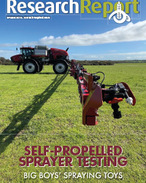This article is 8 years old. Images might not display.
The US team at DuPont Pioneer and the United Sorghum Checkoff Program uncovered two sorghum haploid inducer lines - the first of its kind.
These patent-pending inducer lines enable the creation of doubled haploid sorghum, which is the first step to significantly accelerating the sorghum breeding process.
Sorghum Research Scientist with Pioneer Australia, Ivan Calvert said sharing the technology between the US and Australia would mean new, improved hybrids can reach growers faster.
“It’s very exciting news for DuPont Pioneer all around the world, including Australia, because with this type of technology and development we can achieve spontaneous chromosome doubling with parent development,” Calvert said.
“What it means is, in comparison with our conventional sorghum parent development, which can take up to six generations, double haploid technology can achieve this in one generation.
“This in turn rapidly speeds up hybrid development, delivering traits and yield advantages at a much quicker rate to Australian growers.”
The United Sorghum Checkoff Program funded the Pioneer research in Texas, Kansas, Puerto Rico, Mexico and Iowa, leveraging the world-class, global sorghum breeding programs of Pioneer.
“With this technology, and the additional molecular breeding tools that are used by DuPont Pioneer within our sorghum program, we are able to advance parents at a rapid rate and therefore test many more parental combinations in hybrids over time, which will improve the standard of sorghum hybrids for Australian growers,” Calvert said.
“It’s key that the new process is so much faster, it will take at least three to four years off parent development and then hybrid advancement.”























